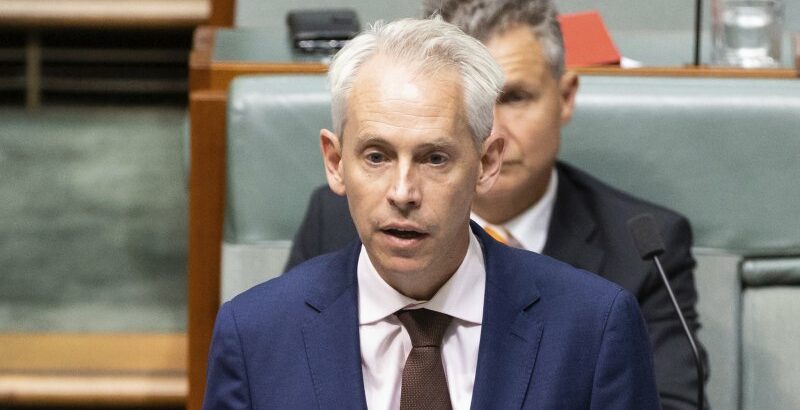Save articles for later
Add articles to your saved list and come back to them any time.
A Rohingya man convicted of raping a 10-year-old boy has been released on strict visa conditions after winning a High Court legal battle against the Commonwealth to overturn a 20-year-old legal precedent that could prompt the release of more than 90 people the government cannot deport.
Immigration Minister Andrew Giles said the government would ensure the safety of the Australian community.Credit: Alex Ellinghausen
Immigration Minister Andrew Giles said the government would do everything possible to ensure community safety but couldn’t act without the advice of the Solicitor General, who warned the High Court on Wednesday that the cohort featured convicted murderers, sex offenders and people smugglers.
Giles said the government had given “quite some thought” to the outcome of the case but declined to outline any solutions, including legislation or special visas, after the Coalition called for an urgent, legislative fix.
“The High Court has just handed down a decision which has substantially changed the operation of the law insofar as it relates to immigration detention,” he said.
“In order to ensure community safety for those who are affected by this, many of whom have committed serious criminal offences, we need to make sure that our response is consistent with the law as set out by the High Court yesterday.”
At least 90 people currently in immigration detention could be released after this ruling. Credit: Shannon Morris
Solicitor General Stephen Donaghue, KC, told the High Court that overturning the Commonwealth’s ability to indefinitely detain people would allow entry into Australia for those with such bad character that they were rejected by every other country.
“The more undesirable they are, such that the more difficult it is to remove them to any other country in the world, the stronger their case for admission into the Australian community,” he said.
Donaghue said about 92 people were in similar situations to the plaintiff, who was given the pseudonym NZYQ, and another 340 people in detention could also be affected by the decision.
According to the Human Rights Law Centre, 127 people have been in immigration detention for more than five years, and the average period spent by people in detention is 709 days.
Opposition home affairs spokesman James Paterson seized on the government’s indecision by accusing Labor of having no “Plan B”.
“They haven’t got any legislation ready to go in the Senate where we’re sitting this week or the House of Representatives next week to deal with this problem of these potentially violent offenders being released in our communities,” Paterson told Perth radio station 6PR.
“And the scary thing is we don’t really know the details about who these people are, where they’ve come from, what crimes that were committed, because the government hasn’t provided any of that information.”
Paterson said that if the government failed to act, the Coalition would explore “all lawful options”.
Josephine Langbien, from the Human Rights Law Centre, told ABC radio on Thursday that Australia’s criminal and immigration detention systems must be kept separate, adding the High Court’s decision would bring about the release of people who should have been freed years ago.
“The Australian Government does not have and has never had the right to use immigration detention as a way to punish people or to extend people’s prison sentences or to effectively impose a sentence of life imprisonment on someone. That’s simply not permissible,” she said.
Foreign Affairs Minister Penny Wong told parliament during Senate question time that the outcome “could trigger the release of a number of people in detention”.
“I am advised that the individual released following the decision of the High Court has been placed on a visa arrangement with strict conditions,” she said. “They include various requirements in relation to reporting and personal details, and other strict requirements.”
Greens immigration spokesperson Nick McKim pressed the government on how many people had been released since the decision was handed down.
Agriculture Minister Murray Watt responded that the government would wait until it received the High Court’s reasons and the advice of the Solicitor General before releasing the other detainees.
Cut through the noise of federal politics with news, views and expert analysis. Subscribers can sign up to our weekly Inside Politics newsletter.
Most Viewed in Politics
From our partners
Source: Read Full Article


